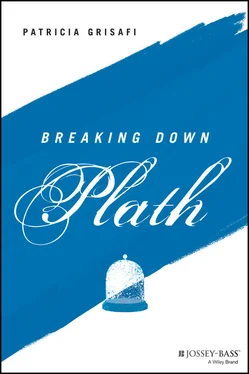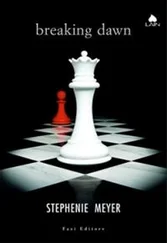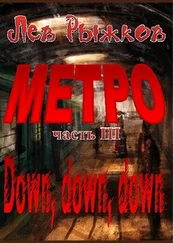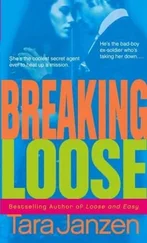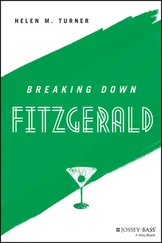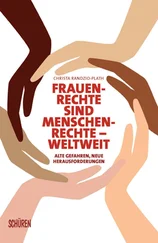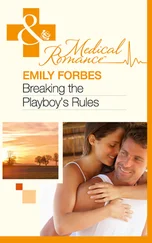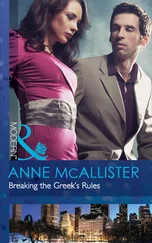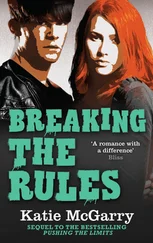Sylvia Plath endures. She holds our attention, and as a result, people all over the world think about her, recite her poetry, and write articles, essays, and books about her. Her novel The Bell Jar (1963) has been translated into more than thirty‐five languages, including Braille. Yet, fifty‐eight years after her death, we find we still have much to learn about Plath the person and Plath the writer.
The recent publication of the more than 1,400 letters Plath composed helps to fuel our interest in her. When combined with her poetry, prose, and other life writing, an astoundingly prolific and diverse person develops who defies singular classification. Plath's output in various genres of writing and media of expression make her an endlessly fascinating area of study.
Patricia Grisafi's Breaking Down Plath is up to the moment. It blends historical and contemporary readings of Sylvia Plath—the major themes in her poetry and important aspects of her prose—in such a way that you, her newest readers, will understand and relate to the mid‐twentieth century's most famous writer.
Peter K. Steinberg, co‐editor of The Letters of Sylvia Plath 11 February 2021
Many thanks to my team at Jossey‐Bass for its support, guidance, and assistance during this process: Riley Harding, Christine O'Connor, and Kezia Endsley. I am grateful to Maria Farland for helping make the opportunity to write a book on Sylvia Plath a reality. An extra big thank you to Peter K. Steinberg for your help; you are an invaluable resource and incredibly generous with your time and knowledge. To Gail Crowther, Fox Frazier Foley, and Li Yun Alvarado, thank you for your helpful feedback, suggestions, and notes on early versions of this project. Cristina Baptista, thank you for your insightful commentary and advice; you truly went above and beyond. To my writing group Erin Khar, Naomi Rand, and Amy Klein: thank you for providing editorial assistance and emotional support. Thank you to The Plath Society for organizing all of the Zoom events that kept Plath scholars and fans connected during the pandemic. I am grateful for the Plath community, especially Julie Goodspeed‐Chadwick, Dave Haslam, Emily Van Duyne, and Elizabeth Winder. Thank you to Jake Currie for being flexible with my work schedule so I could complete this book. To the Ladies’ Group Text—Lauren Navarro, Sophia Chang, and Deborah Schwarz—you guys are a lifeline. Thank you to my therapist, Lisa Youngclaus, for your continued encouragement. Many thanks to my childcare professional, Tashi Sherpa: Without your hard work, it would have been impossible to write this book. Mom and Dad, I am grateful for your continued support and belief in me. To all the writers, teachers, artists, and scholars continuing to bring Sylvia Plath's work to wider audiences: Keep up the wonderful work. As always, thank you to my husband, Scott Goldstein, for reading many drafts of this book and being a truly supportive partner. I could not have done this without you.
Patricia Grisafi, PhD, is a freelance writer, editor, and educator. She received her BA in English from Skidmore College and her PhD in English from Fordham University. She lives in New York City with her husband, son, and two rescue dogs.
When I was a sophomore in high school, I couldn't wait to study Sylvia Plath. I had been reading her work on my own for years and was excited to finally get the chance to dig in with my teacher and fellow students. In the massive Modern American Literature textbook, though, there was only one Plath poem: “Mirror.” It's a fine poem, but it's short and safe; it doesn't ruffle any feathers. Our teacher discussed its themes, talked a little bit about Plath's life, and mentioned that she “died young.” That was it.
I couldn't believe it. In a classroom where we studied at least ten Robert Frost poems and seemingly everything Ralph Waldo Emerson wrote, couldn't we at least read one more Plath poem? (No disrespect to Mr. Frost and Mr. Emerson, of course.)
Today, Sylvia Plath is everywhere. Her name has its own connotation—we associate “Plathian” with anything dark, witty, and shocking. You can buy Sylvia Plath magnets for the fridge and Sylvia Plath socks for a cold night. Plath quotes make good T‐shirt designs. There is an Instagram account dedicated to fans who have gotten Plath tattoos. Lady Gaga and Lana Del Rey, among other musicians, have referred to her in their songs. A 2003 movie was made about her starring Gwyneth Paltrow. Plath is also often mentioned in films focused on teenagers. For example, in Spider‐Man: Homecoming (2017), MJ (played by Zendaya) is wearing a Plath T‐shirt. It functions as a shortcut to understanding MJ's personality: She's a little morbid, no‐nonsense, and into female empowerment.
While Sylvia Plath is now so well‐known she's actually become commoditized, it wasn't always that way. When she died, she was not a household name—not even close. It wasn't until the posthumous publication of Ariel that she became iconic. Over the years, the ways we approach Sylvia Plath's work have shifted, which allows her reputation as an integral writer in American literature to grow. Despite the near‐mythological status she now occupies across film, fashion, and digital media, Plath was first and foremost a woman who wrote. Plath viewed herself as a writer from a young age, and her identity intertwined with writing for her whole life. In a journal entry she wrote at age seventeen, Plath called herself “the girl who wanted to be God”—a phrase that speaks to her ambitious nature.
Plath had many identities—some contradictory. She was a dutiful daughter who also struggled to liberate herself from her family. She was a hard‐working and brilliant student who enjoyed parties and fashion. She was an expatriate —an American who moved to England. She was a wife who wanted to get out of her husband's shadow. She was a mother who wanted to be seen as both a loving parent and a successful career woman. And she was a person who lived with mental illness and died by suicide.
Plath has always spoken to young people, people who feel disenchanted with their world, people who feel deeply and are passionate about life, who feel like they don't belong. She taps into our rage and our joy in a unique way. When I was that disappointed high school student who wanted more Plath and less Emerson, I wondered why the teachers kept her from us. Was she too intense? Too taboo? Not appropriate for high school students? Why did we read The Catcher in the Rye and not The Bell Jar ?
It turns out Plath is more than appropriate—she is necessary. In our contemporary moment, which shares many uncomfortable commonalities with Plath's World War II and Cold War upbringing, Plath's voice is more urgent than ever. For those struggling with mental health issues, she reminds us that we can choose how to define ourselves and our disabilities. For those angry about the prevalence of rape culture, she reminds us that our voices matter and that they can give us power. For those who feel like they don't belong, she reminds us that we can find our people. She reminds us that the personal is still political, that the political is also personal.
Chapter 1 Who Was Sylvia Plath?
PLATH'S CHILDHOOD
Plath was born in Boston, Massachusetts, on October 27, 1932, to Aurelia Schober Plath and Otto Plath. Aurelia was a second‐generation American of Austrian descent, and Otto was an immigrant from Germany. Otto's German heritage would play a huge role in Plath's self‐conception as a middle‐class New Englander.
Читать дальше
